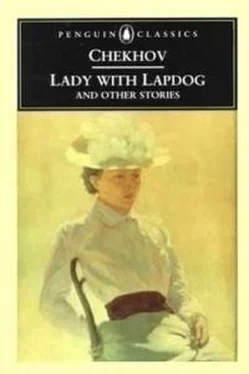"And your irony? Oh, but how well I understand it! Free, bold, living thought is searching and dominating; for an indolent, sluggish mind it is intolerable. That it may not disturb your peace, like thousands of your contemporaries, you made haste in youth to put it under bar and bolt. Your ironical attitude to life, or whatever you like to call it, is your armour; and your thought, fettered and frightened, dare not leap over the fence you have put round it; and when you jeer at ideas which you pretend to know all about, you are like the deserter fleeing from the field of battle, and, to stifle his shame, sneering at war and at valour. Cynicism stifles pain. In some novel of Dostoevsky's an old man tramples underfoot the portrait of his dearly loved daughter because he had been unjust to her, and you vent your foul and vulgar jeers upon the ideas of goodness and truth because you have not the strength to follow them. You are frightened of every honest and truthful hint at your degradation, and you purposely surround yourself with people who do nothing but flatter your weaknesses. And you may well, you may well dread the sight of tears!
"By the way, your attitude to women. Shamelessness has been handed down to us in our flesh and blood, and we are trained to shamelessness; but that is what we are men for—to subdue the beast in us. When you reached manhood and all ideas became known to you, you could not have failed to see the truth; you knew it, but you did not follow it; you were afraid of it, and to deceive your conscience you began loudly assuring yourself that it was not you but woman that was to blame, that she was as degraded as your attitude to her. Your cold, scabrous anecdotes, your coarse laughter, all your innumerable theories concerning the underlying reality of marriage and the definite demands made upon it, concerning the ten sous the French workman pays his woman; your everlasting attacks on female logic, lying, weakness and so on—doesn't it all look like a desire at all costs to force woman down into the mud that she may be on the same level as your attitude to her? You are a weak, unhappy, unpleasant person!"
Zinaida Fyodorovna began playing the piano in the drawing–room, trying to recall the song of Saint Saëns that Gruzin had played. I went and lay on my bed, but remembering that it was time for me to go, I got up with an effort and with a heavy, burning head went to the table again.
"But this is the question," I went on. "Why are we worn out? Why are we, at first so passionate so bold, so noble, and so full of faith, complete bankrupts at thirty or thirty–five? Why does one waste in consumption, another put a bullet through his brains, a third seeks forgetfulness in vodka and cards, while the fourth tries to stifle his fear and misery by cynically trampling underfoot the pure image of his fair youth? Why is it that, having once fallen, we do not try to rise up again, and, losing one thing, do not seek something else? Why is it?
"The thief hanging on the Cross could bring back the joy of life and the courage of confident hope, though perhaps he had not more than an hour to live. You have long years before you, and I shall probably not die so soon as one might suppose. What if by a miracle the present turned out to be a dream, a horrible nightmare, and we should wake up renewed, pure, strong, proud of our righteousness? Sweet visions fire me, and I am almost breathless with emotion. I have a terrible longing to live. I long for our life to be holy, lofty, and majestic as the heavens above. Let us live! The sun doesn't rise twice a day, and life is not given us again—clutch at what is left of your life and save it…."
I did not write another word. I had a multitude of thoughts in my mind, but I could not connect them and get them on to paper. Without finishing the letter, I signed it with my name and rank, and went into the study. It was dark. I felt for the table and put the letter on it. I must have stumbled against the furniture in the dark and made a noise.
"Who is there?" I heard an alarmed voice in the drawing–room.
And the clock on the table softly struck one at the moment.
For at least half a minute I fumbled at the door in the dark, feeling for the handle; then I slowly opened it and walked into the drawing–room. Zinaida Fyodorovna was lying on the couch, and raising herself on her elbow, she looked towards me. Unable to bring myself to speak, I walked slowly by, and she followed me with her eyes. I stood for a little time in the dining–room and then walked by her again, and she looked at me intently and with perplexity, even with alarm. At last I stood still and said with an effort:
"He is not coming back."
She quickly got on to her feet, and looked at me without understanding.
"He is not coming back," I repeated, and my heart beat violently. "He will not come back, for he has not left Petersburg. He is staying at Pekarsky's."
She understood and believed me—I saw that from her sudden pallor, and from the way she laid her arms upon her bosom in terror and entreaty. In one instant all that had happened of late flashed through her mind; she reflected, and with pitiless clarity she saw the whole truth. But at the same time she remembered that I was a flunkey, a being of a lower order…. A casual stranger, with hair ruffled, with face flushed with fever, perhaps drunk, in a common overcoat, was coarsely intruding into her intimate life, and that offended her. She said to me sternly:
"It's not your business: go away."
"Oh, believe me!" I cried impetuously, holding out my hands to her. "I am not a footman; I am as free as you."
I mentioned my name, and, speaking very rapidly that she might not interrupt me or go away, explained to her who I was and why I was living there. This new discovery struck her more than the first. Till then she had hoped that her footman had lied or made a mistake or been silly, but now after my confession she had no doubts left. From the expression of her unhappy eyes and face, which suddenly lost its softness and beauty and looked old, I saw that she was insufferably miserable, and that the conversation would lead to no good; but I went on impetuously:
"The senator and the tour of inspection were invented to deceive you. In January, just as now, he did not go away, but stayed at Pekarsky's, and I saw him every day and took part in the deception. He was weary of you, he hated your presence here, he mocked at you…. If you could have heard how he and his friends here jeered at you and your love, you would not have remained here one minute! Go away from here! Go away."
"Well," she said in a shaking voice, and moved her hand over her hair. "Well, so be it."
Her eyes were full of tears, her lips were quivering, and her whole face was strikingly pale and distorted with anger. Orlov's coarse, petty lying revolted her and seemed to her contemptible, ridiculous: she smiled and I did not like that smile.
"Well," she repeated, passing her hand over her hair again, "so be it. He imagines that I shall die of humiliation, and instead of that I am …amused by it. There's no need for him to hide." She walked away from the piano and said, shrugging her shoulders: "There's no need…. It would have been simpler to have it out with me instead of keeping in hiding in other people's flats. I have eyes; I saw it myself long ago…. I was only waiting for him to come back to have things out once for all."
Then she sat down on a low chair by the table, and, leaning her head on the arm of the sofa, wept bitterly. In the drawing–room there was only one candle burning in the candelabra, and the chair where she was sitting was in darkness; but I saw how her head and shoulders were quivering, and how her hair, escaping from her combs, covered her neck, her face, her arms…. Her quiet, steady weeping, which was not hysterical but a woman's ordinary weeping, expressed a sense of insult, of wounded pride, of injury, and of something helpless, hopeless, which one could not set right and to which one could not get used. Her tears stirred an echo in my troubled and suffering heart; I forgot my illness and everything else in the world; I walked about the drawing–room and muttered distractedly:
Читать дальше












